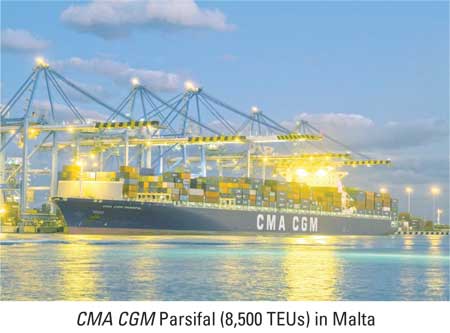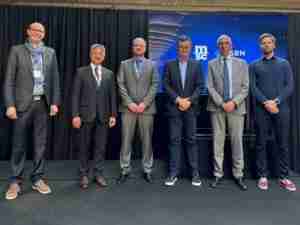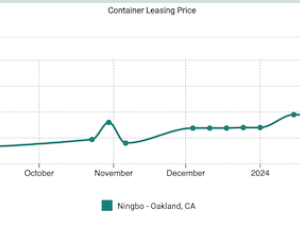In a year shaped by a sudden slowdown in the world economy that affected the shipping industry during the second half, the CMA CGM Group maintained its growth trajectory in 2008. Expansion was driven by the strategic decisions to:
- Develop partnerships and space exchanges with comparable-sized shipping groups to share capacity and improve service quality.
- Launch new services in growing markets.
- Expand the Group's presence in reefer transport, cargo projects and other niche markets.
- Invest in the acquisition of more productive vessels and in innovative, cost-effective and environmentally friendly technologies (electronic injection ship engines, reefers equipped with energy-efficient motors, light steel containers, etc.)
CMA CGM also continued its strategy of investing in major terminals, such as Malta, Tianjin, Xiamen, Miami, Odessa and Latakia, to secure its shipping operations over the long term and optimize productivity.
At the end of 2008:
- The CMA CGM Group reported revenue of $15.1 billion, up 28.2% compared with 2007.
- Net income stood at $124 million and will be entirely reallocated to strengthening the Group's equity, as in previous years.
- Freight volumes rose by 15.6% to 8.9 million TEU.
- The fleet comprised 395 vessels, of which 98 owned.
- The container fleet represented 1.76 million TEU, up 14%. The reefer fleet rose sharply during the year, making CMA CGM the world's second largest carrier of goods in refrigerated containers.

This performance reflected the commitment and quality of the CMA CGM teams, who deliver their powerful skills and expertise through a network of more than 650 agencies in 150 countries serving more than 30,000 international customers.
In response to a difficult 2009, the CMA CGM Group is introducing new cost-saving measures:
The Group is continuing to rationalize its services in slowing markets, consolidating lines and strengthening partnerships to maintain service quality while reducing costs.
Because three-quarters of the fleet is chartered, CMA CGM has significant leeway to adjust to market demand. In 2009, more than 180 ships will come out of charter and will either be returned to their owners or renewed or replaced at attractive contract rates, leading to substantial cost savings for the Group.
In a commitment to revising its cost structure, the Group is increasingly operating its ships at economical speed to lower bunker fuel consumption. CMA CGM is campaigning for lower transit rates in the Suez and Panama canals and will continue to reroute part of the fleet via the Cape of Good Hope. It has also begun renegotiating contracts with terminals and shipyards to reduce costs.
All these new measures, which will be deployed in 2009, will reduce operating costs by approximately $600 million.
Lastly, the Group enjoys two major competitive strengths:
It has a modern fleet that will be further enhanced by the 2009 to 2012 delivery of 52 state-of-the-art, competitive vessels that will generate significant economies of scale and replace current units.
It is a global operator benefiting from local expertise through its subsidiaries (DELMAS, CNC, COMANAV, US LINES, etc.), which are experienced in their markets and capable of quickly seizing growth opportunities.
On April 1, 2009, CMA CGM increased its freight rates, which had dropped to unjustifiably low levels.
''Thanks to our forward-looking strategy, the flexibility of our systems and processes and our international expertise, we are quite confident in the ability of our company and our management team to successfully weather the current crisis,' said Jacques R. Saad', Chairman and Founder of the CMA CGM Group. 'Trade between Asia and especially Europe and the United States wil





